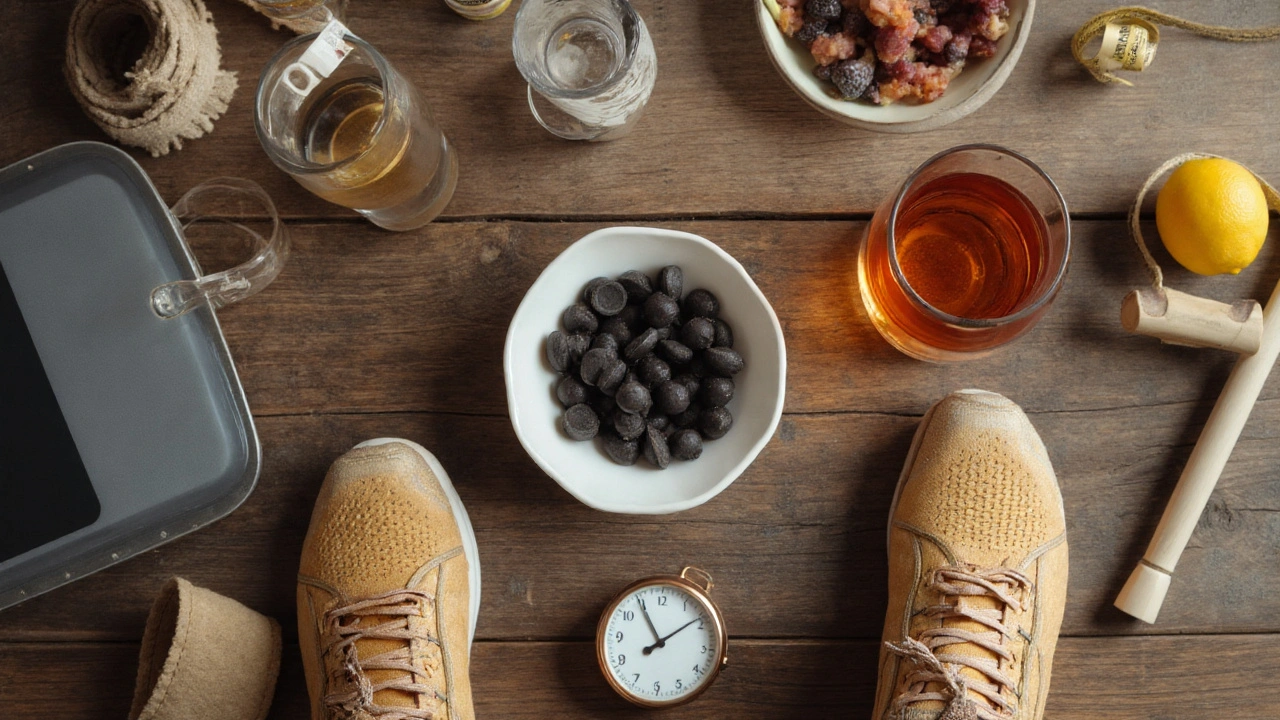Black Tea Supplements: Evidence-Based Benefits, Dosage, and Safe Use for Diet and Wellness
 Aug, 30 2025
Aug, 30 2025
You want better energy, appetite control, and real nutrition wins without a total diet overhaul. Black tea supplements can help-but only if you use them right. The payoff is modest but meaningful: steadier focus, a small boost in weight management, and gut-friendly polyphenols. Here’s what’s real, what’s hype, and how to build them into your day without side effects.
TL;DR
- What it does: Small but useful help for focus, appetite awareness, gut health, and cardiometabolic markers.
- What’s inside: Theaflavins (unique to black tea), thearubigins, caffeine, and a bit of L-theanine.
- Evidence: Human trials show modest drops in blood pressure and LDL; a 2017 European Journal of Nutrition study tied black tea to gut microbiome changes linked to weight control (in mice).
- Dosage: Start low-100-200 mg black tea extract or 50-100 mg theaflavins, once daily with breakfast or lunch.
- Safety: Keep total caffeine under 400 mg/day (adults). If pregnant, aim under 200 mg/day. Separate from iron by 2 hours.
What black tea supplements do (and don’t): the straight story
Black tea is not just “green tea but darker.” Fermentation changes its chemistry. You get theaflavins and thearubigins-polyphenols you won’t find in the same amounts in green tea. Most products offer “black tea extract” capsules or standardized theaflavin blends. You’ll also see caffeine on the label. If you want a simple definition: black tea supplements are concentrated tea actives without the teacup.
What can you expect? A bit more mental clarity from caffeine and L-theanine working together; a nudge on appetite awareness, not a miracle fat burner; and gentler cardiometabolic shifts if you pair them with solid basics (protein, fiber, steps, sleep). Think “smart assist,” not “silver bullet.”
The evidence you can actually use:
- Gut health and weight: UCLA researchers (European Journal of Nutrition, 2017) showed black tea polyphenols altered gut bacteria and reduced weight gain in mice on a high-fat diet. Mouse data isn’t human destiny, but it hints at a microbiome angle that fits what many people notice: less snacking, steadier energy.
- Blood pressure: A meta-analysis of randomized trials in the American Journal of Clinical Nutrition (2013) found small reductions in systolic and diastolic blood pressure with tea consumption (often around 1-3 mmHg). Small changes add up over a year.
- Cholesterol: Reviews of black tea trials (Journal of Nutrition and related cardiometabolic reviews, 2015-2021) report modest LDL improvements, especially in folks with higher baseline levels and when tea replaces sugary drinks.
- Focus and mood: Caffeine provides alertness; L-theanine smooths the edges. Black tea has less L-theanine than green tea, but the combo still beats coffee alone for some people.
What it won’t do: melt fat off by itself, fix a high-sodium diet, or replace movement. If your protein is low and sleep is a mess, start there first. Tea works better in a good system.
Forms you’ll see:
- Black tea extract (BTE): General polyphenol blend. Labels might list “polyphenols” or “theaflavins %.”
- Theaflavin-standardized products: More targeted, often lower caffeine.
- Decaf BTE: For caffeine-sensitive users; still gives polyphenols.
- Regular brewed tea: Cheap, pleasant, and reliable. Less concentrated but easy to sustain.
How brew vs supplement stacks up:
| Form | Typical caffeine/serving | Polyphenols/serving (approx.) | Notable actives | Pros | Cons |
|---|---|---|---|---|---|
| Brewed black tea (8 oz) | 40-70 mg | 150-300 mg | Theaflavins, thearubigins, L-theanine | Low cost, hydrating, easy habit | Less precise dose; iron absorption impact if taken with meals |
| Black tea extract capsule | 0-80 mg (varies) | 200-500 mg (standardized) | Polyphenols; sometimes added theaflavins | Precise dose, convenient, can choose low-caffeine | Quality varies; may upset stomach if empty |
| Theaflavin-standardized capsule | Often <20 mg | 50-200 mg theaflavins | Theaflavins | Targeted, gentler on caffeine | Pricier; fewer broad polyphenols |
| Decaf black tea extract | <5 mg | 200-400 mg | Polyphenols without caffeine | Good for evenings and sensitive users | No alertness boost |
Safety snapshot:
- Caffeine limits: Most healthy adults can handle up to 400 mg/day (European Food Safety Authority, FDA guidance). Single doses above ~200 mg can feel edgy for some.
- Pregnancy: Keep caffeine under 200 mg/day (American College of Obstetricians and Gynecologists). If you supplement, pick low-caffeine or decaf and clear it with your OB.
- Iron: Tea polyphenols reduce non-heme iron absorption. If you’re iron-deficient, take tea or supplements 2 hours away from iron-rich meals or iron pills; pair iron with vitamin C to help absorption.
- Liver: Concerns in the past center on very high-dose green tea EGCG. Black tea extracts at typical doses are not linked to liver issues in healthy adults. If you have liver disease, ask your clinician before using any concentrated extract.
- Conditions: Be cautious if you have arrhythmias, uncontrolled blood pressure, GERD, or anxiety disorders. The low-caffeine route helps.

How to use black tea supplements and see real results
Here’s a practical plan you can follow this week. It’s simple on purpose.
- Set one clear goal. Pick what you care about most: steadier energy, fewer snack attacks, or cardiometabolic nudge (BP, LDL). One goal beats three.
- Choose your format.
- Want focus and appetite support? Regular BTE with moderate caffeine.
- Want gut and heart benefits without jitters? Decaf BTE or theaflavin-only.
- Prefer habits over pills? Two cups of brewed tea per day.
- Start low, don’t rush.
- Capsules: 100-200 mg black tea extract once daily with breakfast or lunch, or 50-100 mg theaflavins.
- Brewed tea: 1 cup daily for a week, then 2 cups. Brew 3-4 minutes; longer steeping = more polyphenols and caffeine.
- Time it smartly.
- Take earlier in the day. Leave 6+ hours before bedtime if there’s caffeine.
- Separate from iron-rich meals by 2 hours. If you take iron supplements, keep a bigger gap.
- If you get an upset stomach, take with food or switch to decaf/low-caffeine.
- Stack with high-yield habits.
- Protein at breakfast (25-35 g) to amplify appetite control.
- Fiber target 25-38 g/day (veggies, beans, oats) to feed your microbiome.
- Steps: 7-10k/day. Tea plus light movement outperforms tea alone.
- Hydration: Add one glass of water with each tea serving.
- Track and adjust.
- Measure what matters: weekly waist, morning energy rating, BP at home if you track it.
- If you feel wired, switch to decaf or cut the dose in half.
- If nothing changes after 6-8 weeks, re-check basics (protein, fiber, sleep) or pause-no need to force it.
- Consider cycling. If you take caffeinated products daily, try 5 days on/2 off, or take a deload week every 8 weeks. Sensitivity returns; results often feel stronger after a short break.
Rules of thumb you can lean on:
- Most people feel best with 100-200 mg extract once daily; heavy caffeine users might add a second dose at lunch.
- Don’t exceed labels. If a product doesn’t list caffeine, assume there’s some unless it says “decaf.”
- Two cups of brewed tea most days is a low-cost, low-risk alternative with similar long-game benefits.
Common mistakes (and easy fixes):
- Taking it at night → move to morning or go decaf.
- Pairing with steak or your iron pill → separate by 2 hours; add vitamin C to iron meals.
- Chasing fat loss without protein and fiber → add both; tea can then help you notice “I’m full” signals.
- Ignoring blood pressure or meds → track at home if you’re at risk; ask your clinician if you’re on stimulants or BP meds.
Simple decision guide:
- If caffeine makes you jittery: pick decaf black tea extract or theaflavins.
- If your goal is focus: regular BTE, morning only.
- If your goal is gut support: daily brewed tea or decaf BTE with fiber-rich meals (but not iron-heavy ones).
- If you take iron for deficiency: keep a 2-hour buffer; test ferritin after 8-12 weeks if you drink tea daily.

Tools, checklists, and answers you’ll actually use
Use these to buy smart, stay consistent, and avoid the usual pitfalls.
Buyer’s checklist (fast skim in the aisle or online):
- Label lists “black tea extract” or “theaflavins” with a % standardization (e.g., 40-50% polyphenols or 25-40% theaflavins).
- Clear caffeine amount per serving (or clearly marked decaf).
- Third-party testing stamp (USP, NSF, Informed Choice, or equivalent).
- No mega-doses or “proprietary blends” that hide amounts.
- Serving size aligns with your plan (once daily is easier to stick to).
Daily use checklist (takes 10 seconds):
- Took it with breakfast or lunch.
- Kept it 2 hours away from iron-rich meals or iron supplements.
- Logged quick notes: energy (1-10), cravings (low/med/high), any jitters or reflux.
- Drank one glass of water with it.
Quick examples (so you can visualize it):
- Focus and appetite: One capsule (150 mg BTE, ~40 mg caffeine) with eggs and toast at 8 a.m.; second cup of brewed tea at 1 p.m.; no caffeine after 3 p.m.
- Gut support with low caffeine: Decaf BTE (200 mg) at 9 a.m.; oatmeal with berries and chia; lentil soup at lunch.
- Budget-friendly: Two mugs of store-brand black tea daily, 3-4 min steep; walk after dinner; keep caffeine under 300-400 mg total.
Mini-FAQ
- Is it safe to take daily? For most healthy adults, yes at typical doses. Keep total caffeine under 400 mg/day (EFSA/FDA). If pregnant, stay under 200 mg/day (ACOG) and talk to your clinician first.
- Tea or capsule-what’s better? Capsules give precise dosing and can be low-caffeine. Brewed tea is cheaper, hydrating, and easy to sustain. Pick the one you’ll stick with.
- Can it replace coffee? It can, if you like a smoother lift. Tea’s caffeine + L-theanine often feels cleaner than coffee for some.
- When will I notice something? Focus changes show up day one. Appetite awareness and BP/LDL shifts take weeks. Give it 4-8 weeks before judging.
- Any meds to watch? Be careful with stimulants, some asthma meds, and certain heart meds. If in doubt, ask your pharmacist to check caffeine and polyphenol interactions.
- What about liver safety? Issues are mostly tied to high-dose green tea EGCG. Standard black tea extracts at labeled doses are considered low risk in healthy adults.
- Does it block minerals? It can lower non-heme iron absorption. Keep a 2-hour buffer from iron-rich meals or iron pills, or add vitamin C with iron.
Next steps
- If you’re caffeine sensitive: start with decaf BTE or theaflavins at breakfast; add a brewed cup only if you feel fine.
- If fat loss is the goal: set protein and fiber targets, walk daily, and use tea as a pre-meal cue to slow down and check hunger.
- If heart health is the goal: track home BP twice weekly at the same time of day; share 4-8 weeks of readings with your clinician.
Troubleshooting
- Jitters or fast heart rate: halve the dose or switch to decaf; avoid taking with other caffeine sources; hydrate.
- Stomach upset or reflux: take with food; shorten tea steep time; try decaf or theaflavin-only.
- No change after 8 weeks: re-check calories, protein (25-35 g per meal), fiber (25-38 g/day), sleep (7-9 hours). If those are solid, tea may not move the needle for you-pause and spend your budget elsewhere.
- Iron markers dropping: move all tea and supplements away from iron by 2-3 hours; add vitamin C to iron-rich meals; retest ferritin.
Why this works
The plan here lines up with what the literature shows: black tea’s theaflavins and related polyphenols deliver small but steady nudges to the systems that matter-appetite, microbiome, blood pressure, lipids. The changes are modest on paper, but they add up when you pair them with the habits that do the heavy lifting. If you keep the caffeine sensible and time your dose, you get the upsides without the common downsides.
Credibility notes
- European Journal of Nutrition (2017): black tea polyphenols shifted gut microbiota and body weight in mice.
- American Journal of Clinical Nutrition (2013) meta-analysis: small reductions in blood pressure with regular tea intake.
- Reviews in Journal of Nutrition and Advances in Nutrition (2015-2021): modest improvements in LDL and other cardiometabolic markers with tea polyphenols.
- EFSA and FDA guidance: up to 400 mg caffeine/day for most healthy adults; ACOG: under 200 mg/day in pregnancy.
Use this as a simple, sustainable add-on. If it fits your day and your body likes it, you’ll feel the difference where it counts: steadier focus, fewer mindless snacks, kinder numbers at your next checkup.
Sophia Lyateva
September 18, 2025 AT 15:21AARON HERNANDEZ ZAVALA
September 19, 2025 AT 02:08Lyn James
September 19, 2025 AT 09:29Craig Ballantyne
September 20, 2025 AT 15:01Victor T. Johnson
September 22, 2025 AT 12:21Nicholas Swiontek
September 23, 2025 AT 17:20Robert Asel
September 24, 2025 AT 22:03Shannon Wright
September 25, 2025 AT 15:06